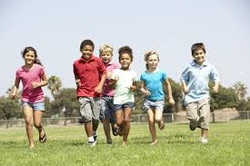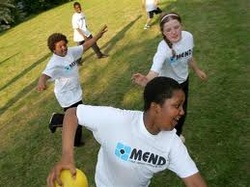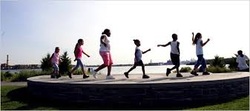 ispygod.net
ispygod.net Researchers analyzed data spanning 46 years and involving more than 25 million children in 28 countries. On average, children today run a mile 90 seconds slower than did their counterparts 30 years ago.
Across nations, cardiovascular endurance—gauged by how far children can run in a set time—has dwindled consistently by about 5% every decade, according to the findings. The decline in endurance is seen in boys and girls and across all ages from nine to 17 years, and is linked to obesity, with some countries faring worse than others. In the UK, half of seven year olds don't get enough exercise according to research. Whilst nearly two out of three boys do an hour's physical activity a day, for girls it is around one in three.
 www.ecommunity.com
www.ecommunity.com Prof Michael Gwitz of the American Heart Association stresses that the exercise needs to make a person or child sweat and should be sustained and dynamic to promote cardiovascular fitness. Simply going to the gym or belonging to a school sports team might not be enough without plenty of movement. Parents, schools and community groups can all help kids on their way to 60 minutes exercise a day.
So how can anyone motivate children to be active? School sports are vital. But parental input is crucial. Seven year olds today face more distractions, more incentives to sit, than any previous generation. For many of them, the computer tablet, apps or smart phones are a part of daily life. Sadly, many regard playing outside as a dull alternative to controlling a computer game.
 www2.kirklees.gov.uk
www2.kirklees.gov.uk Two things are crucial. First is making physical activity routine—part of daily life. Walking to school is one obvious example. Parents who set an example and do exercise tend to have more active children. The second is finding a sport or activity which engages the child.
The Change4Life campaign is aimed at encouraging people of all ages to lead healthier, more active lives. Its motto, "Eat well, move more, live longer", sums up the aim of the campaign. It already has half a million members.
 www.nytimes.com
www.nytimes.com In the Drop-Out 70s when my children were young, we had no such toys. We even gave up the television until the school required them to use it. When home in the country town of Robe, South Australia, they walked everywhere they needed to go, which included the swimming at the nearby beach, exercising at the playground and collecting firewood or wildflowers for our craft shop. Their father and I considered the possibility of a future apocalypse because of missiles pointed at all major cities in the world at that time. I made sure they would have every chance to survive if civilization should be destroyed.
What would happen to these unfit and unprepared children if a catastrophe, either natural or man-made, happened now?
See my co-written novels on the sidebar, where a young group of survivors in the future after the Great Flood form together to search for a way to save mankind. In the first of the Moonstone series, Wind Over Troubled Waters, sixteen-year-old Cerridwen loses her mother in a landslide.

 RSS Feed
RSS Feed






